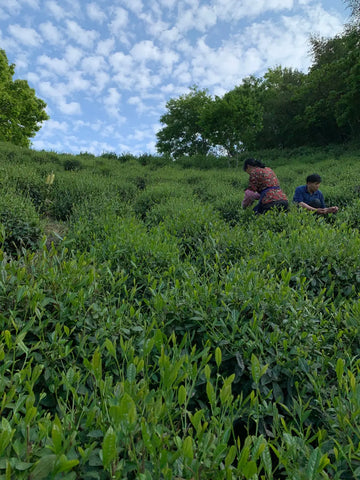In the southeastern region of China lies Anhui Province, an area reputed by artists and poets for its unmatched natural beauty that playfully contrasts dark granite stones with towering pines, creating a vivid landscape bathed in a sea of clouds and punctuated with natural hot springs. The area is capped by Mount Jiuhua, which is one of the four famous Buddhist Mountains.

Remarkably, some of the villages in Anhui—which were founded more than 800 years ago—have even managed to preserve ancient Chinese architecture, art, and ways of life. In the village of Xidi, for instance, there are over 100 residences that date back to the Ming and Qing dynasties.
Indeed, everything about Anhui seems ancient and mystical, and it happens to be home to some of our favorite teas, from our gongfu-crafted Keemun black tea to the inimitable, artisanal Tai Ping Hou Kui green tea. Huan Shan Mountain, also located in Anhui, even gifts us with the increasingly rare and difficult to produce wild-grown yellow tea.
While they are each all amazing, one that has captured our hearts has been Lu An Gua Pian!
Located in the mountains on the outskirts of Lu’an city, from where this tea derives part of its name, the tea that has come to be known as Gua Pian is grown. We discussed in a previous post what we wanted from a Lu An Gua Pian and just how much is required to artisanally craft a good one. Though it’s a green tea, it’s production is unique and impressive.


Gua Pian is sometimes mistranslated as Melon Seed, and this is owed in part to a shortening of its name over time, which used to be Gua Zi Pian or Sunflower Seed. The reason for its name has to do with how the tea is plucked and produced, giving it a distinctive appearance.
While many green teas consist of buds with one or two young leaves, farmers pluck only single, mature leaves for this tea, usually leaving the buds and stems on the plant. The best Gua Pian is even picked during Gu Yu, the rainy season in late April, to ensure that the mature leaves have had time to grow to the desired size.
This tea really breaks all of the rules for green tea—which is why we playfully call it punk rock tea—and this is largely responsible for its rich flavor and resilience to high heat water during an infusion. In fact, the locals actually prefer to prepare Lu An Gua Pian above 200°F (95°C), usually letting the tea leaves rest in a tall glass while they sip it!

Our particular batch of Lu An Gua Pian caught the attention of professional tea tasters during the North American Tea Championship two years ago, and we’re thrilled with this season’s results, believing it might be the best one yet!
If you’re feeling edgy and different, you can certainly try this punk rock tea local style, but if you’re new to this tea, you may want to first try it at a lower temperature, say 185°F (85°C), adjusting to your preferred taste by increasing the temperature or infusion time.







Leave a comment